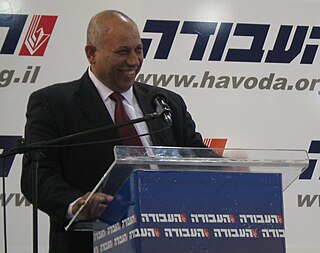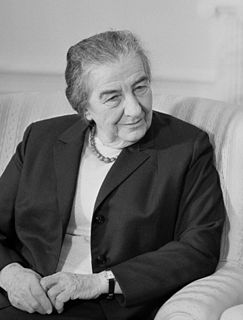External links
- Knesset members in the Sixteenth Knesset Knesset website
The 120 members of the sixteenth Knesset were elected on 28 January 2003. The breakdown by party was as follows:

The Israeli system of government is based on parliamentary democracy. The Prime Minister of Israel is the head of government and leader of a multi-party system. Executive power is exercised by the government. Legislative power is vested in the Knesset. The Judiciary is independent of the executive and the legislature. The political system of the State of Israel and its main principles are set out in 11 Basic Laws. Israel does not have a written constitution.

The Knesset is the unicameral legislature of Israel. As the supreme state body, the Knesset is sovereign and thus has complete control of the entirety of the Israeli government.
The Religious Zionist Party, known as Tkuma until 2021 and still officially known as National Union–Tkuma, is a right-wing religious Zionist political party in Israel.
Elections for the 16th Knesset were held in Israel on 28 January 2003. The result was a resounding victory for Ariel Sharon's Likud.

Early general elections for both the Prime Minister and the Knesset were held in Israel on 17 May 1999 following a vote of no confidence in the government; the incumbent Likud Prime Minister Benjamin Netanyahu, ran for re-election.
Elections for the sixth Knesset were held in Israel on 2 November 1965. Voter turnout was 85.9%.

Raleb Majadele is an Israeli Arab politician. He served as a member of the Knesset for the Labor Party in three spells between 2004 and 2015, and became the country's first Muslim minister when appointed Minister without Portfolio on 28 January 2007. Between March 2007 - March 2009 he served as Minister of Science, Culture and Sport, the first Muslim minister in Israeli history.
Legislative elections were held in Israel on 31 December 1973. Voter turnout was 78.6%. The election was postponed for two months because of the Yom Kippur War.

Zvi Hendel is an Israeli politician who served as a member of the Knesset for the Tkuma faction of the National Union between 1996 and 2009.

The fifteenth government of Israel was formed by Golda Meir on 15 December 1969 following the October elections. The government was a continuation of the national unity government formed during the previous Knesset, and consisted of the Alignment, Gahal, the National Religious Party, the Independent Liberals and the Israeli Arab parties Progress and Development and Cooperation and Brotherhood. Gahal left the coalition in early August 1970 after the government agreed to accept the Rogers Plan.

Elections for the 18th Knesset were held in Israel on 10 February 2009. These elections became necessary due to the resignation of Prime Minister Ehud Olmert as leader of the Kadima party, and the failure of his successor, Tzipi Livni, to form a coalition government. Had Olmert remained in office or had Livni formed a coalition government, the elections would have been scheduled for 2010 instead.

The sixteenth government of Israel was formed by Golda Meir on 10 March 1974, following the December 1973 elections. However, following Meir's resignation as Prime Minister on 11 April, it only remained in office until 3 June, and at just 85 days, was the shortest-lived government in Israeli political history.

The seventeenth government of Israel was formed by Yitzhak Rabin on 3 June 1974, following the resignation of Prime Minister Golda Meir on 11 April and Rabin's election as Labor Party leader on 26 April. It was the first time an Israeli government had been led by a native-born Israeli.

The twenty-seventh government of Israel was formed by Benjamin Netanyahu of Likud on 18 June 1996. Although his Likud-Gesher-Tzomet alliance won fewer seats that the Labor Party, Netanyahu formed the government after winning the country's first ever direct election for Prime Minister, narrowly defeating incumbent Shimon Peres. This government was the first formed by an Israeli national born in the state after independence in 1948.

The thirtieth government of Israel was formed by Ariel Sharon on 28 February 2003, following Likud's comprehensive victory in the January elections. His coalition initially included Shinui and the National Union, holding 60 of the 120 seats in the Knesset, whilst the two-seat Yisrael BaAliyah merged into Likud shortly after. The National Religious Party also joined the coalition on 3 March 2003, taking the number of seats it held up to 66.

Otzma Yehudit is a far-right political party in Israel, which has been referred to as Kahanist and anti-Arab. It was originally formed as Otzma LeYisrael, and was established on 13 November 2012 by MKs Aryeh Eldad and Michael Ben-Ari, who split from the National Union to form a new party ahead of the 2013 elections. Despite coming to an agreement with the Jewish Home to contest the 2020 Israeli legislative election as the United Jewish Home, Otzma was left to run independently when the Jewish Home, the New Right, and Tkuma re-formed Yamina. In the 2021 election, Otzma ran on a joint list with the Religious Zionist Party and Noam, sparking outrage among many.

The United Arab List, commonly known by its Hebrew acronym Ra'am, is an Arab political party in Israel and the political wing of the Southern Branch of the Islamic movement. It was part of the Joint List but left the alliance on 28 January 2021. In 2021 it formally joined a coalition of parties forming the thirty-sixth government. It is currently led by Mansour Abbas.
Ron Katz is an Israeli lawyer and politician. He is currently a member of the Knesset for Yesh Atid.